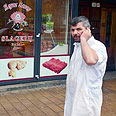
Muslim butcher's shop in Amsterdam
צילום: AP
Victory for Dutch inciters
Op-ed: Proposed kosher slaughter ban in Holland based on emotions, not on science
In the Netherlands, the debate on a law to prohibit religious slaughter of unstunned animals has been a prime public issue during the past few months. It got more attention than the possible collapse of the Euro, which will have an infinitely greater impact.
On Tuesday, the lower chamber of the Dutch parliament voted by a great majority for what is probably an effective ban on religious slaughter without stunning an animal first. The appeal of the private law as proposed by Marianne Thieme, the leader of the small Party for the Animals, derived from several fallacies. The first was that many Dutchmen believed that the bill was aimed at the majority of Muslims. The second was a manipulation of science to convince many Dutchmen that all religious slaughter is more painful than all stunned slaughter. Hatred against religion among an increasing number of secular Dutchmen also contributed to the emotionalism.
The huge public debate became most revealing about the general functioning of Dutch society far beyond the marginal issue of religious slaughter. Thus, it is important to analyze the development of the anti-religious slaughter incitement. Thieme and her party whipped up emotions by screening a YouTube video which showed ugly examples of religious slaughter filmed somewhere abroad. It did not interest anyone that there are similar videos on the Internet which show major animal maltreatment in cases of stunned slaughter.
Thieme backed up her claims about religious slaughter with two scientific reports. These were generally believed to have been prepared by researchers from the respectable University of Wageningen. Shortly before the parliamentary vote, however, the university denied any connection to the reports and its author. They were prepared by a private organization with a similar sounding name, Wageningen UR.
There was major critique leveled against many claims in both reports. A senior American academic expert, Professor Joe Regenstein of Cornell University, listed dozens of questions and criticisms. He was supported by the world’s leading expert on animal slaughter, Professor Temple Grandin. Instead of offering answers to the many concrete criticisms raised, the head of the Party for the Animal’s research institute said that Regenstein was biased.
In the natural sciences, such ad hominem attacks are absurd. A scholar whose research has been criticized must answer the relevant questions, show that the results of his experiments substantiate his conclusions and even more importantly, that his experiments can be replicated. The attacked scholar in this case did not do so.
The head of the research bureau of the Party for the Animals was even more audacious in her approach against TNO, a leading Dutch applied science research organization. It analyzed the methodology of the Wageningen UR reports and expressed major criticism. Upon this, the Animal Party research head stated that TNO was no more competent in the field than an organization of garage owners and car dealers would be.
Jews the only victims
The issue of genuine scientific proof about religious slaughter by then was no longer relevant in an incited Dutch society. By that time it had also become clear that most Halal eating Muslims are willing to eat meat from animals which have been religiously slaughtered after stunning. Orthodox Jews were thus the only full victims of this law.
Concerning Jews, the Party for the Animals made misleading statements. On the basis of an opinion expressed by a Conservative rabbi in the US, it implied that the large Rabbinical Assembly of Conservative Rabbis was of the opinion that slaughter after stunning can be kosher. When informed of that statement, the RA requested an apology from the Party of the Animals. Furthermore, it should be known that kosher slaughter under Conservative supervision in the US is apparently non-existent.
A number of parties that experienced internal opposition against the parliamentary faction’s desire to support Thieme’s bill changed their position somewhat. They proposed a motion which was accepted, with a vague loophole. Unstunned religious slaughter may continue in cases where proof is provided that it is not more painful than average slaughter practices. This seems exceedingly difficult in view of the overall scientific uncertainties about pain experienced by animals.
Many Dutch people get upset when one points out to them that the law - which they wrongly consider a breakthrough for animal welfare - is an expression of anti-Semitism. There are hundreds of millions of animals slaughtered per year in the Netherlands, many of which live under stressful conditions. Next to them, those for the minority of Muslims who refuse to eat Halal from stunned animals and the 3,000 kosher animals pale in comparison.
Further proof of anti-Semitism is that the Wageningen UR reports which Thieme still wholeheartedly supports, state that kosher slaughter of chickens is better for animal welfare than regular industrial slaughter. If the Party for the Animals were truly concerned about major improvements in animal welfare, it should have proposed kosher slaughter for the huge number of chickens slaughtered industrially.
There are general lessons to be learned from all of this. One is that in a secularized society a pseudo-religion such as animal welfare concerns based on emotions serves as a substitute for religion. Another is that in today’s Netherlands, one can pass laws based upon unproven or non-existent science. The precondition for that is to be able to whip up emotions in society.
For the Jews though, there is a special lesson. They must always be on guard in the seemingly tolerant Dutch society. Even if this law does not pass the senate or if the government refuses to countersign it, these lessons will remain valid.
Manfred Gerstenfeld is the author of 20 books. Last year his book in Dutch The Decay; Jews in a Rudderless Netherlands sparked a major debate in the Netherlands
- Follow Ynetnews on Facebook










